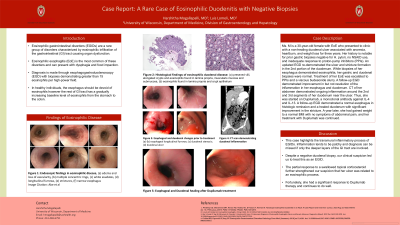Sunday Poster Session
Category: Esophagus
P0563 - Case Report: A Rare Case of Eosinophilic Duodenitis With Negative Biopsies
Sunday, October 27, 2024
3:30 PM - 7:00 PM ET
Location: Exhibit Hall E

Has Audio

Harshitha Mogallapalli, MD
University of Wisconsin Hospitals and Clinics
Madison, WI
Presenting Author(s)
Harshitha Mogallapalli, MD, Luis Lomeli, MD
University of Wisconsin Hospitals and Clinics, Madison, WI
Introduction: Eosinophilic gastrointestinal disorders (EGIDs) are a rare group of disorders characterized by eosinophilic infiltration of the gastrointestinal (GI) tract causing organ dysfunction. Eosinophilic esophagitis (EoE) is the most common of these disorders and can present with dysphagia and food impaction. Diagnosis is made through esophagogastroduodenoscopy (EGD) with biopsies demonstrating greater than 15 eosinophils per high-power field. In healthy individuals, the esophagus should be devoid of eosinophils however the rest of GI tract has a gradually increasing baseline level of eosinophils from the stomach to the colon.
Case Description/Methods: Ms. M is a 30-year-old female with EoE who presented to clinic with a non-healing duodenal ulcer associated with anorexia, heart burn, and weight loss for three years. Her history is notable for prior gastric biopsies negative for H. pylori, no NSAID use, and inadequate response to proton-pump inhibitors (PPIs). An updated EGD re-demonstrated the ulcer and stricture formation in the 2nd portion of the duodenum. While biopsies of her esophagus demonstrated eosinophilia, her gastric and duodenal biopsies were normal. Treatment of her EoE was escalated to PPIs and a viscous budesonide slurry. A follow-up EGD demonstrated improvement in but not resolution of the inflammation in her esophagus and duodenum. CT of her abdomen demonstrated ongoing inflammation around the 2nd and 3rd segments of her duodenum near the ulcer. Thus, she was started on Dupilumab, a monoclonal antibody against IL-4 and IL-13. A follow-up EGD demonstrated a normal esophagus in histologic remission and a healed duodenum with significant improvement in the stricture. A year later, she had gained weight to a normal BMI with no symptoms of abdominal pain, and her treatment with Dupilumab was continued.
Discussion: This case highlights the transmural inflammatory process of EGIDs. Inflammation tends to be patchy and diagnosis can be missed if only the deeper layers of the GI tract are involved. Despite a negative duodenal biopsy, our clinical suspicion led us to treat this as an EGID. The partial response to a swallowed topical corticosteroid further strengthened our suspicion that her ulcer was related to an eosinophilic process. Fortunately, she had a significant response to Dupilumab therapy and continues to do well.
Disclosures:
Harshitha Mogallapalli, MD, Luis Lomeli, MD. P0563 - Case Report: A Rare Case of Eosinophilic Duodenitis With Negative Biopsies, ACG 2024 Annual Scientific Meeting Abstracts. Philadelphia, PA: American College of Gastroenterology.
University of Wisconsin Hospitals and Clinics, Madison, WI
Introduction: Eosinophilic gastrointestinal disorders (EGIDs) are a rare group of disorders characterized by eosinophilic infiltration of the gastrointestinal (GI) tract causing organ dysfunction. Eosinophilic esophagitis (EoE) is the most common of these disorders and can present with dysphagia and food impaction. Diagnosis is made through esophagogastroduodenoscopy (EGD) with biopsies demonstrating greater than 15 eosinophils per high-power field. In healthy individuals, the esophagus should be devoid of eosinophils however the rest of GI tract has a gradually increasing baseline level of eosinophils from the stomach to the colon.
Case Description/Methods: Ms. M is a 30-year-old female with EoE who presented to clinic with a non-healing duodenal ulcer associated with anorexia, heart burn, and weight loss for three years. Her history is notable for prior gastric biopsies negative for H. pylori, no NSAID use, and inadequate response to proton-pump inhibitors (PPIs). An updated EGD re-demonstrated the ulcer and stricture formation in the 2nd portion of the duodenum. While biopsies of her esophagus demonstrated eosinophilia, her gastric and duodenal biopsies were normal. Treatment of her EoE was escalated to PPIs and a viscous budesonide slurry. A follow-up EGD demonstrated improvement in but not resolution of the inflammation in her esophagus and duodenum. CT of her abdomen demonstrated ongoing inflammation around the 2nd and 3rd segments of her duodenum near the ulcer. Thus, she was started on Dupilumab, a monoclonal antibody against IL-4 and IL-13. A follow-up EGD demonstrated a normal esophagus in histologic remission and a healed duodenum with significant improvement in the stricture. A year later, she had gained weight to a normal BMI with no symptoms of abdominal pain, and her treatment with Dupilumab was continued.
Discussion: This case highlights the transmural inflammatory process of EGIDs. Inflammation tends to be patchy and diagnosis can be missed if only the deeper layers of the GI tract are involved. Despite a negative duodenal biopsy, our clinical suspicion led us to treat this as an EGID. The partial response to a swallowed topical corticosteroid further strengthened our suspicion that her ulcer was related to an eosinophilic process. Fortunately, she had a significant response to Dupilumab therapy and continues to do well.
Disclosures:
Harshitha Mogallapalli indicated no relevant financial relationships.
Luis Lomeli indicated no relevant financial relationships.
Harshitha Mogallapalli, MD, Luis Lomeli, MD. P0563 - Case Report: A Rare Case of Eosinophilic Duodenitis With Negative Biopsies, ACG 2024 Annual Scientific Meeting Abstracts. Philadelphia, PA: American College of Gastroenterology.
